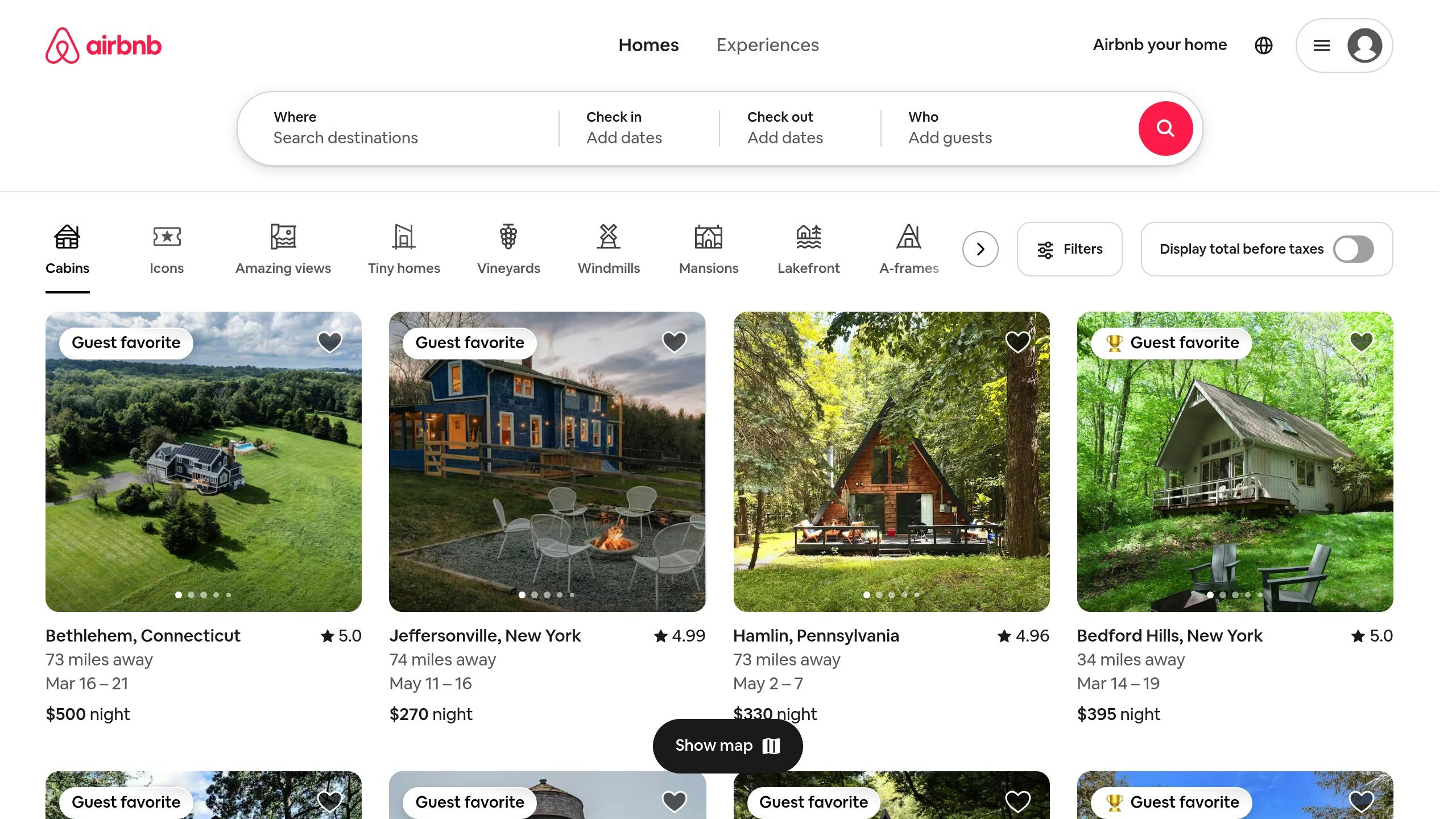Starting September 30, 2024, new short-term rental regulations will apply to areas like Sheet Harbour, Guysborough, and Sherbrooke. These rules aim to address housing shortages while supporting tourism. Here's what property owners need to know:
-
Registration Fees:
- $500/year for commercial properties (Tier 2).
- $50/year for primary residences with 1-4 rooms.
- $150/year for primary residences with 5+ rooms.
-
Key Compliance Requirements:
- Register your property by September 16, 2024 to meet the deadline.
- Provide proof of municipal compliance (zoning and land-use bylaws).
- Display your registration number on booking platforms like Airbnb.
-
Fines for Non-Compliance:
- Minimum: $1,000 per violation.
- Maximum: $100,000 annually.
-
Market Snapshot:
- Average annual revenue: $12,100.
- Occupancy rate: 45%.
- Entire-home rentals dominate (85% of listings).
These changes are part of the Short-Term Rentals Registration Act (STRRA), designed to balance housing needs with tourism growth. Stay compliant by preparing early and following the guidelines.
The End of AirBnB in Halifax, Nova Scotia? Short-Term Rental Update

Nova Scotia Provincial Regulations
Starting September 30, Nova Scotia's Short-Term Rentals Registration Act (STRRA) introduces new rules for short-term rentals, affecting areas like Sheet Harbour, Guysborough, and Sherbrooke.
Registration Requirements
Before listing properties on platforms such as Airbnb or Vrbo, owners in the Eastern Shore must register under Tier 2. Here's the fee breakdown:
| Property Type | Annual Fee | Requirements |
|---|---|---|
| Primary Residence | $50 | One registration per address |
| Commercial (Tier 2) | $500 | Separate registration for each property |
| Tourist Accommodations (1-4 rooms) | $50 | Proof of municipal compliance |
| Tourist Accommodations (5+ rooms) | $150 | Proof of municipal compliance |
Key details about registration:
- Registration numbers are non-transferable between owners.
- Renewals are due annually by April 1.
- Different civic addresses require separate registrations.
- Submit applications by September 16 to ensure timely processing [2].
Non-compliance with these rules can lead to hefty penalties.
Fines and Enforcement
- Minimum fine: $1,000 per violation
- Maximum fine: $100,000 annually
These fines highlight the seriousness of enforcement, with local authorities integrating these measures into their operations.
"Starting September 30, new regulations for short-term rentals will come into play in Nova Scotia. The province is introducing the Short-Term Rentals Registration Act (STRRA) to tackle the growing affordable housing shortage." [2]
Local Implementation
Local officials are tasked with enforcing these rules while addressing the dual goals of supporting tourism and managing housing challenges. In 2023, Nova Scotia saw a 14% increase in tourism, welcoming 2.2 million visitors [2]. This growth has added pressure to balance housing availability with tourism demands.
Property owners should verify municipal permissions, provide compliance documentation, and meet safety standards. Brennan LeJean, JD, noted:
"The updated short-term rental regulations in Nova Scotia represent a step toward balancing the interests of tourists, property owners, and local communities." [4]
A provincial housing review predicts a shortage of 41,200 units in Nova Scotia by 2027/28 [2]. This projection influences how regulations are applied across different regions. Owners in the Eastern Shore are encouraged to stay in touch with municipal offices for updates on any changes to the rules.
Town-Specific Rules and Zoning
Local regulations expand on provincial guidelines, introducing fees and zoning rules tailored to the needs of Sheet Harbour, Guysborough, and Sherbrooke. These rules aim to address local priorities while staying within the broader provincial framework.
Sheet Harbour Rules
Sheet Harbour falls under Tier 2 for commercial short-term rentals. Key requirements include:
- Commercial Registration Fee: $500 per year (provincial mandate)
- Primary Residence Fee: $50 for properties with 4 or fewer bedrooms; $150 for 5 or more bedrooms
- Proof of compliance with land-use bylaws
- A valid registration number is mandatory for all listing platforms starting September 30, 2024
Guysborough County Guidelines
Operators in Guysborough County must follow municipal land-use bylaws before registering. Here’s an overview:
| Requirement | Details |
|---|---|
| Registration Tier | Commercial STR – Tier 2 |
| Annual Fee | $500 |
| Booking Duration | Maximum of 28 consecutive days |
| Compliance Proof | Documentation of land-use bylaw adherence |
Sherbrooke also has its own set of requirements for short-term rentals.
Sherbrooke Requirements
Sherbrooke introduces additional steps for short-term rental hosts. Operators must:
- Obtain an Airbnb license
- Secure all necessary permits
- Maintain liability insurance
- Register their property
- Follow zoning regulations
- Stay within annual rental night limits
These measures aim to balance tourism growth with local housing needs while ensuring responsible management of short-term rentals.
sbb-itb-b5e1074
Meeting Legal Requirements
To legally operate a short-term rental on the Eastern Shore, you need to follow safety protocols, tax rules, and maintain accurate records.
Safety Standards and Insurance
Ensure your rental property complies with all safety regulations set by provincial and municipal authorities. This includes adhering to fire safety rules, scheduling regular inspections, and securing the required insurance. Failure to meet these standards can result in fines ranging from $1,000 to $100,000 per violation [4].
Tax Requirements
Short-term rental operators are required to collect 15% HST on all bookings. You’ll also need to report rental income using CRA Form T776, which allows you to claim deductible expenses like property taxes, maintenance, insurance, utilities, and professional fees. Filing deadlines vary: self-employed individuals must file by June 15, while others have until April 30 [6]. Keeping accurate records and operating transparently are key to avoiding tax issues.
Common Compliance Issues
Avoid common pitfalls by addressing these key compliance steps:
- Register your property with the Provincial Tourist Accommodation Registry before the September 30, 2024 deadline [3].
- Keep essential documents current, such as proof of property ownership and municipal land-use compliance certificates.
- Display your registration number on all booking platforms and maintain detailed records of guest stays, revenue, and tax payments.
Operating without a valid registration number is illegal [2]. Since municipal documentation requests can take weeks to process, it’s smart to start early and regularly review requirements to ensure you stay compliant.
Help and Support
Running a successful short-term rental on Nova Scotia's Eastern Shore requires dependable support. One standout option is Casa Scotia, a company specializing in Airbnb and short-term rental management tailored to property owners in the region.
Casa Scotia: Airbnb Management Services
Since its launch in Halifax in 2016, Casa Scotia has helped property owners across Nova Scotia generate over $3 million in revenue[7]. Their services cover all the essentials:
| Service Category | What They Offer |
|---|---|
| Compliance Management | Help with registration, local regulation tracking, and handling necessary documents |
| Revenue Optimization | Tools like dynamic pricing, market research, and competitive rate analysis |
| Property Care | Cleaning services, maintenance coordination, and routine inspections |
| Guest Management | Around-the-clock communication, guest screening, and seamless check-in/out processes |
"I never imagined making this much from my property without lifting a finger. Casa Scotia made everything simple - my income doubled, and stress vanished completely." - Laura M., Halifax Property Owner[7]
Conclusion
Managing a short-term rental on Nova Scotia's Eastern Shore requires careful attention to both provincial and local regulations. As of July 30, 2024, there were 7,235 registered short-term rentals in Nova Scotia[8], highlighting the need for property owners to stay compliant.
Quick Reference Guide
| Requirement | Details for Sheet Harbour, Guysborough & Sherbrooke |
|---|---|
| Registration Fee | $500 CAD (Tier 2 Commercial) or $50 CAD (Primary Residence)[2] |
| Documentation | Proof of municipal land-use compliance and property details[3] |
| Timeline | Report any registration changes within 10 days[1] |
| Support Resources | Access Nova Scotia offices and 311 for planning help[3] |
Key Compliance Steps for Property Owners
- Verify Municipal Compliance: Reach out to local planners via 311 to ensure your property aligns with land-use bylaws[3].
- Complete Registration: Submit your application through the Short-term Rentals Registry[5].
- Keep Records Updated: Maintain accurate and current compliance documents and registration information[1].
By following these steps, you can stay compliant as rules continue to change.
Updates and Changes
Regulations for short-term rentals are subject to updates. Any changes to your registration details must be reported to the Minister within 10 days[1]. Stay informed by checking official resources like The Royal Gazette Part II, updates from the Minister of Municipal Affairs and Housing, and tools like the interactive zoning map.
The Short-term Rentals Registry team carefully reviews all submitted details and documents[5], so ensure your information is accurate and submitted on time.
Related Blog Posts
- Short term rental regulation in HRM ( Halifax, Bedford, Dartmouth )
- Short-Term Rental Regulations in Nova Scotia: Annapolis Valley (Wolfville, Kentville, Annapolis Royal)
- Short-Term Rental Regulations in Nova Scotia: Cape Breton Island (Sydney, Baddeck, Inverness)
- Short-Term Rental Regulations in Nova Scotia: Parrsboro & Bay of Fundy Region



